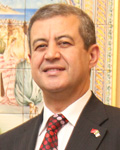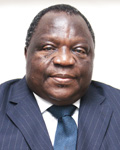|
In what ways can the AU foster pan-Africanism and the African renaissance?
Ethiopian Ambassador Seyoum Mesfin: Truly, the AU is the major leader, and probably the only major leader that can move all other mechanisms toward the creation and building of genuine unity among Africans and African countries.
To unite Africa into one prosperous and peaceful continent cannot be achieved in one go, or in a short period of time. This unity will definitely have to be built brick by brick, stone by stone with a solid foundation, and will require a comprehensive approach.
The AU is truly the vehicle for this unity. What the AU can do is what the member countries of the AU are prepared to do—they have to prepare to seek their sovereign interests stage by stage, to empower the AU, to address issues in the interest of our collective will and desire. And there is no substitute for the AU in leading the continent toward unity.

Algerian Ambassador Hassane Rabehi: Since its creation in 1963, the OAU made every effort to promote greater African economic, social, cultural and political integration. The AU has embarked on a struggle for a united Africa, economic independence and development that would change the lives of Africans for the better.
Among the contributions to the African renaissance by the AU, I would like to mention: adoption and implementation of the Language Plan of Action; establishment of the African Academy of Languages in 2006 in Bamako; strengthening the work of the Center for Linguistic and Historical Studies by Oral Tradition, based in Niamey; the Charter for African Cultural Renaissance, adopted in Khartoum; the Pan-African Cultural Festival held in Algiers, Algeria in 1965 and 2009; and the African Renaissance Monument in Dakar.
What are the challenges facing the AU today? How can these challenges be met?
Ethiopian Ambassador Seyoum Mesfin: Africa is a continent endowed with huge natural resources of paramount importance to the development of the continent and the global community. But in spite of this potential, Africa is still one of the least developed continents today. Africa's human resources have to be transformed into human capital. We have to advance in education, science and technology. We have to transform our natural resources into real capital.
The AU has fought harder than any other organization to make the collective African voice heard. Africa is one of the continents affected by the impact of climate change not of its own making. Africa can collectively negotiate for mitigation and adaptation of the negative impact of climate change and ensure that this global threat is averted through collective action. We need to interact with the global community to do this, so the AU in particular is our collective voice to safeguard the interests of Africa.
Algerian Ambassador Hassane Rabehi: Education, self-sufficient food production, unemployment, illegal immigration, refugees, agriculture, climate change, and a lack of financial means are some of the challenges for the AU. Health poses a great challenge, and is being dealt with by accelerating reduction of maternal mortality in Africa and by fighting the scourges of HIV, tuberculosis and malaria.
The AU is aware of the challenges that lie ahead of us, and will do everything in its power to achieve the goals of the continental agenda, including stability, security and development.
How do you see the future of China-Africa relations?

Togolese Ambassador Nolana Ta Ama: I would say the partner that has been most actively on Africa's side is China, which has, especially since 1949 [when the People's Republic of China was founded], developed diplomatic relations based on mutual cooperation aimed at dealing with all challenges facing the continent.

Cape Verde's Ambassador Julio Morais: China has been, and continues to be, the AU's strong and faithful ally, a commitment that is fully illustrated by the new AU headquarters building, which was donated by the Chinese Government. China, since the 1960s, has helped Africa face its difficulties and also supported its development endeavors, either bilaterally or multilaterally.
Email us at: yanwei@bjreview.com | 